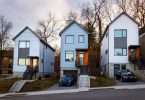Innovative exterior cladding system forms ‘envelope’ around existing home, maximizing energy efficiency without demolition
August 1, 2022 — A team of building industry innovators has been awarded a $4.9 million grant from the U.S. Department of Energy to field test a newly developed building retrofit system. The team, led by the Fraunhofer USA Center for Manufacturing Innovation at Boston University, includes two Pittsburgh-based non-profits, the Green Building Alliance and Rising Tide Partners.
The centerpiece of the project will be an integrated, energy efficiency retrofit of two residential properties in the Pittsburgh region. The retrofits will demonstrate the latest innovations in exterior cladding systems. Once installed, these systems form a new building ‘envelope’―a set of integrated components that separate the interior environment from the exterior environment. The new building envelope encloses the existing home, providing greater building performance and maximizing energy efficiency.
Two Pittsburgh-area homes will be selected to demonstrate the system.
The Fraunhofer USA system deploys the installation of prefabricated, insulated panel-blocks, along with additional high-performance building technologies, to seal the home and deliver a high-quality, exterior appearance. System design and installation incorporate digital tools such as laser scanning, computer-aided design, computer-aided manufacturing, and augmented reality (AR) to empower workers and minimize site work, allowing residents to remain in their homes during the retrofit process. When installed, the system creates a new building envelope, reducing energy consumption by at least 75% while enhancing the exterior appearance of the home.
Demonstrating quality retrofit solutions that achieve significant energy savings while also being fast, affordable, and convenient, the project seeks to drive the production of scalable, commercialized retrofit packages for U.S. homes and buildings.
“Developing affordable, effective, and appealing deep energy retrofits for smaller buildings is crucial to achieving state and national greenhouse gas reduction goals,” notes project co-Principal Investigator Dr. Kurt Roth. “We are thrilled to support the Department of Energy in meeting this ‘grand challenge.’”
“We are looking forward to applying emerging technologies to the construction industry that has seen a negative productivity growth over the past few decades,” adds co-Principal Investigator Dr. Andre Sharon, Center Director and Professor of Mechanical Engineering at Boston University. “GBA and Rising Tide Partners will play a key role, engaging with the construction workforce and identifying commercialization challenges to inform the scalability of our technology development efforts.”
The role of the Green Building Alliance will include reviewing the local residential building codes and the requirements that may impact the design, manufacture, and installation of the proposed retrofit system. Additionally, GBA will engage with building code officials, the local residential construction workforce, and the communities that will host the demonstration projects. Once the retrofit projects are completed, GBA will collect feedback from the project partners to help develop a commercialization plan.
“This DOE funding supports GBA’s goals of developing innovative, practical strategies for establishing more sustainable communities right here in Pittsburgh, and for improving the quality of affordable housing in the region,” says Green Building Alliance Executive Director Jenna Cramer. “It also supports our larger mission as a UN International Center of Excellence to create healthy, affordable, and resilient places for all by distilling best practices in design, construction, products, workforce training, and policy, and then sharing them broadly to enable widespread adoption.”
Rising Tide Partners (RT), a Pittsburgh-based nonprofit that works to improve the quality of affordable rental homes to improve the health and housing stability for existing families, will provide the two homes that will be transformed by the application of the retrofit system. RT will also facilitate community and stakeholder engagement and assist with the retrofit project execution.
“RT brings an inventory of properties and development expertise to ensure the retrofit packages can be scaled to work with Pittsburgh’s diverse housing stock,” said Rising Tide Executive Director Kendall Pelling. “RT will match the building improvements to properties that can both demonstrate the technology and benefit the existing tenants. Properties selected will be in communities where RT is working with local organizations to prevent displacement by acquiring and protecting affordable rental homes. Low-income residents will benefit from homes that will be healthier and more energy efficient.”
The project is anticipated to take three years to plan and execute, with documentation and development of a commercialization plan anticipated in year four.
The Pittsburgh project is one of 30 next-generation building retrofit projects (seven awardees) receiving a total of $32 million in DOE funding to dramatically improve affordable housing technologies. According to the DOE, the projects will test renovation techniques that reduce disruption to tenants while upgrading the energy and environmental performance of buildings more quickly, affordably, and effectively. These techniques, such as prefabricating walls and drop-in replacements for heating, cooling, and hot water systems, can revolutionize construction and renovation. They can also provide the means to decarbonize America’s 130 million buildings at the rate needed to address the climate crisis and meet President Biden’s goals of a net zero carbon economy by 2050. Read the full DOE press release here.
###
CONTACT:
Laura Ellis
Veritas Communications Advisors
412.952.7844 / lellis@veritaspr.com
About Fraunhofer USA Center for Manufacturing Innovation
The Fraunhofer USA Center for Manufacturing Innovation at Boston University (CMI) conducts applied research and development in the areas of energy systems, industrial automation, and biotechnology. A non-profit organization, CMI works closely with industry to develop, demonstrate, and commercialize innovative technologies that have real-world impact. CMI is an established performer of applied R&D contracts for government agencies, including DoD, DOE, NSF, NIH and NYSERDA.
About the Green Building Alliance
Green Building Alliance (GBA) positively transforms the world through the built environment to create a sustainable, healthy, and just future for everyone. As Greater Pittsburgh’s authority on sustainable design, GBA drives the market for healthy communities while equipping designers, manufacturers, developers, and policymakers to catalyze systemic change. GBA manages the largest 2030 District in North America (the Pittsburgh 2030 District), and in 2019, established Pittsburgh as the 2nd International Centre of Excellence on High Performance Building in the world. GBA partners across Western Pennsylvania, with strategic alliances including the 2030 District Network, United Nations and International Living Future Institute.







